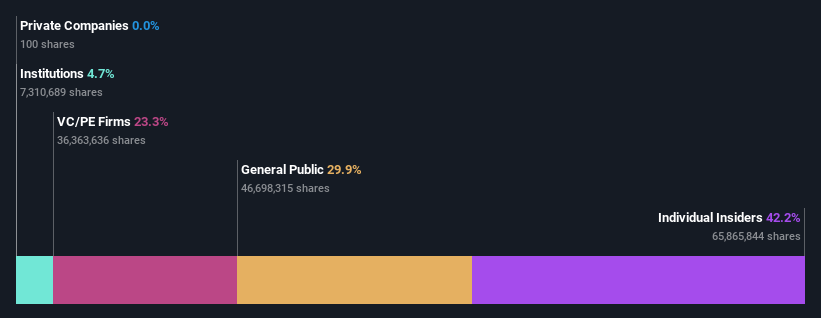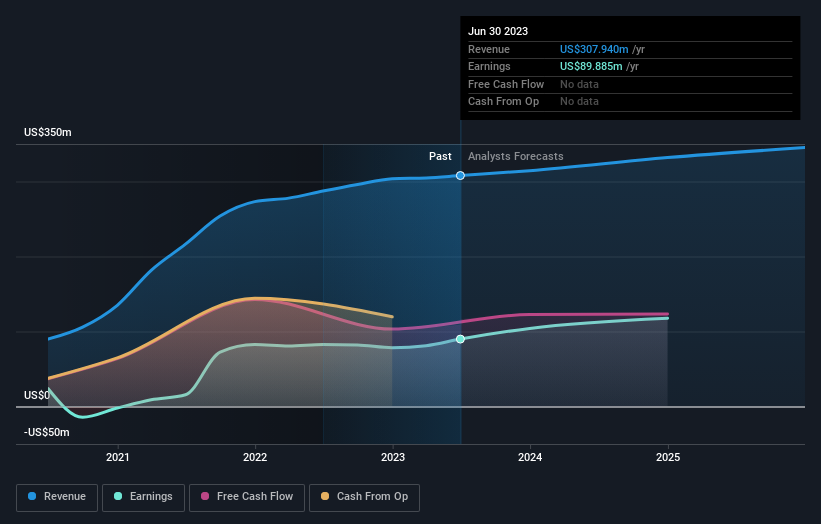With 42% ownership, Yalla Group Limited (NYSE:YALA) insiders have a lot riding on the company's future
Key Insights
Significant insider control over Yalla Group implies vested interests in company growth
55% of the business is held by the top 2 shareholders
Analyst forecasts along with ownership data serve to give a strong idea about prospects for a business
Every investor in Yalla Group Limited (NYSE:YALA) should be aware of the most powerful shareholder groups. The group holding the most number of shares in the company, around 42% to be precise, is individual insiders. In other words, the group stands to gain the most (or lose the most) from their investment into the company.
With such a notable stake in the company, insiders would be highly incentivised to make value accretive decisions.
Let's take a closer look to see what the different types of shareholders can tell us about Yalla Group.
See our latest analysis for Yalla Group
What Does The Institutional Ownership Tell Us About Yalla Group?
Institutional investors commonly compare their own returns to the returns of a commonly followed index. So they generally do consider buying larger companies that are included in the relevant benchmark index.
Less than 5% of Yalla Group is held by institutional investors. This suggests that some funds have the company in their sights, but many have not yet bought shares in it. If the company is growing earnings, that may indicate that it is just beginning to catch the attention of these deep-pocketed investors. We sometimes see a rising share price when a few big institutions want to buy a certain stock at the same time. The history of earnings and revenue, which you can see below, could be helpful in considering if more institutional investors will want the stock. Of course, there are plenty of other factors to consider, too.
Hedge funds don't have many shares in Yalla Group. Looking at our data, we can see that the largest shareholder is the CEO Tao Yang with 37% of shares outstanding. With 17% and 5.8% of the shares outstanding respectively, Orchid Asia Group Management, Ltd. and SIG Asia Investments, LLLP are the second and third largest shareholders.
After doing some more digging, we found that the top 2 shareholders collectively control more than half of the company's shares, implying that they have considerable power to influence the company's decisions.
While it makes sense to study institutional ownership data for a company, it also makes sense to study analyst sentiments to know which way the wind is blowing. There are plenty of analysts covering the stock, so it might be worth seeing what they are forecasting, too.
Insider Ownership Of Yalla Group
The definition of company insiders can be subjective and does vary between jurisdictions. Our data reflects individual insiders, capturing board members at the very least. The company management answer to the board and the latter should represent the interests of shareholders. Notably, sometimes top-level managers are on the board themselves.
Most consider insider ownership a positive because it can indicate the board is well aligned with other shareholders. However, on some occasions too much power is concentrated within this group.
Our most recent data indicates that insiders own a reasonable proportion of Yalla Group Limited. Insiders have a US$354m stake in this US$839m business. We would say this shows alignment with shareholders, but it is worth noting that the company is still quite small; some insiders may have founded the business. You can click here to see if those insiders have been buying or selling.
General Public Ownership
The general public-- including retail investors -- own 30% stake in the company, and hence can't easily be ignored. While this group can't necessarily call the shots, it can certainly have a real influence on how the company is run.
Private Equity Ownership
With a stake of 23%, private equity firms could influence the Yalla Group board. Sometimes we see private equity stick around for the long term, but generally speaking they have a shorter investment horizon and -- as the name suggests -- don't invest in public companies much. After some time they may look to sell and redeploy capital elsewhere.
Next Steps:
While it is well worth considering the different groups that own a company, there are other factors that are even more important. To that end, you should be aware of the 1 warning sign we've spotted with Yalla Group .
Ultimately the future is most important. You can access this free report on analyst forecasts for the company.
NB: Figures in this article are calculated using data from the last twelve months, which refer to the 12-month period ending on the last date of the month the financial statement is dated. This may not be consistent with full year annual report figures.
Have feedback on this article? Concerned about the content? Get in touch with us directly. Alternatively, email editorial-team (at) simplywallst.com.
This article by Simply Wall St is general in nature. We provide commentary based on historical data and analyst forecasts only using an unbiased methodology and our articles are not intended to be financial advice. It does not constitute a recommendation to buy or sell any stock, and does not take account of your objectives, or your financial situation. We aim to bring you long-term focused analysis driven by fundamental data. Note that our analysis may not factor in the latest price-sensitive company announcements or qualitative material. Simply Wall St has no position in any stocks mentioned.


